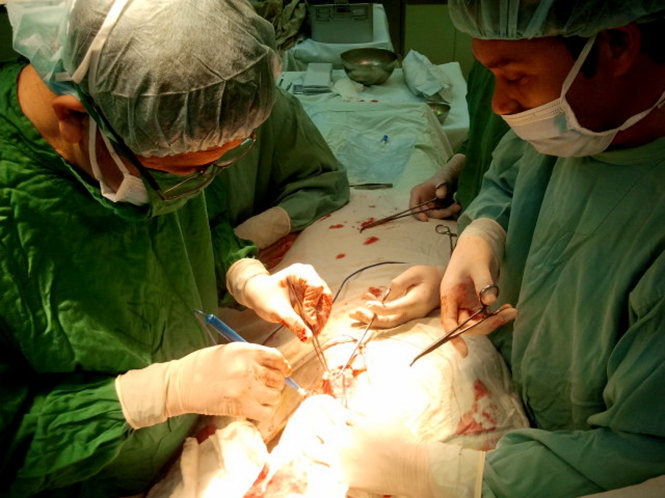Editor’s note: Nguyen Vu Thu Trang, 39, wishes that in the next two decades, hospitals in Vietnam will be “houses of love” in her submission to the “Ky Vong Viet Nam 20 Nam Toi” (“My Expectations for Vietnam in 20 Years”) writing contest.
>> An audio version of the story is available here
I’ve cherished a dream that 20 years later, all Vietnamese people would use the affectionate word “nha thuong” (house of love/compassion) instead of “benh vien” (hospital).
Health is one of humans’ most valuable assets. Healthcare is one of the public welfare policies adopted by rich, developed countries.
Hospitals or houses of love/compassion would be the places where patients are given the best medical attention.
Hospitals at both grassroots and central levels would be serene, spacious places which are both clean and gorgeous-looking.
The facilities would then be full of compassion for fellow citizens and armed with cutting-edge equipment. The medical staff members would boast excellent expertise, and be cheery and dedicated to patients as if they were their own kin. They would be the ones that patients trust and act well in accordance with a motto that reads, “devoted doctors are just like loving mothers.”
Hospitals would also be where people are entitled to fairness and equality in treatment, whether they are rich or poor and seek treatment using medical insurance or expensive services.
But what should be done so that people think of hospitals first thing whenever they have health problems?
First of all, let’s discuss the conscience and responsibility assumed by medical staff.
Most medical students start out as outstanding students in high school and can become doctors only after years of tough training at medical universities.
Apart from professional training, the future doctors and nurses would also learn a skill that is usually taken for granted: smiling.
The government should also apply encouraging salary regimes so that medical staff would be able to earn a decent living from their profession which is highly looked up to in society.
Doctors would be dedicated to their jobs, constantly improving their skills and updating themselves on world medical advances. They should also be allowed to join training courses at home and abroad.
If so, they would no longer worry about their livelihood as they do now by shuttling between their daytime jobs at hospitals and night jobs at private healthcare facilities.
Nursing would also be a well-sought profession in terms of both quality and quantity. Nurses would take care of in-patients and tend to them at their home after they are discharged.
Patients would only go to hospitals for medical examinations, checkups and surgeries. Patients would be discharged right after their operations, as they follow doctors’ treatment plans and are cared for at their own home by nurses.
Of course nurses would be rewarded deservingly. Patients would be properly looked after, while nurses would have the chance to fully develop their potential. That would also help relieve overloading at most hospitals. Nurses should receive training at qualified schools for both their medical skills and professional ethics.
That would help nurture people’s habit of going to hospital for examinations whenever people come down with even minor health problems. Once they trust doctors’ diagnosis and treatment, they would no longer buy medicine haphazardly based on the “counseling” provided by drugstore attendants. That would also stop them being hospitalized only when their conditions aggravate.
Patients would no longer be deterred by the indifference demonstrated by doctors and nurses as they are hospitalized or request to be transferred to higher-level hospitals. People would then realize buying insurance is their own responsibility and right.
Policies should be adopted in transferring medical staff from central-level hospitals to grassroots infirmaries every three, six months or one year, and the other way round.
Geographically speaking, provincial clinics would become central facilities’ divisions able to ease crowding at central hospitals and provide training for medical staff. Above all, locals, particularly the poor, would save considerably on traveling costs and be entitled to premium medical care.
Let’s get started right now by planning and managing human resources, investing in facility construction, purchasing equipment that suit different locales, and adopting incentive policies to draw medical staff to underprivileged areas. If so, 20 years later, we would have hospitals which would be affectionately dubbed “houses of love/compassion.”
|
“Ky Vong Viet Nam 20 Nam Toi” is a competition organized by the World Bank in Vietnam and Tuoi Tre (Youth) newspaper that encourages local youths to write down their wildest, yet feasible, dreams about how Vietnam will change in 20 years’ time. |




















































